Key takeaways:
- Online integrity is about authenticity, accountability, and balancing self-expression with honesty.
- Privacy advocacy empowers individuals to manage their personal data and foster a collective culture of transparency.
- Effective strategies for maintaining privacy include using strong passwords, enabling two-factor authentication, and utilizing VPNs.
- Building a supportive online community relies on sharing knowledge, empathy, and actively engaging with others’ experiences.
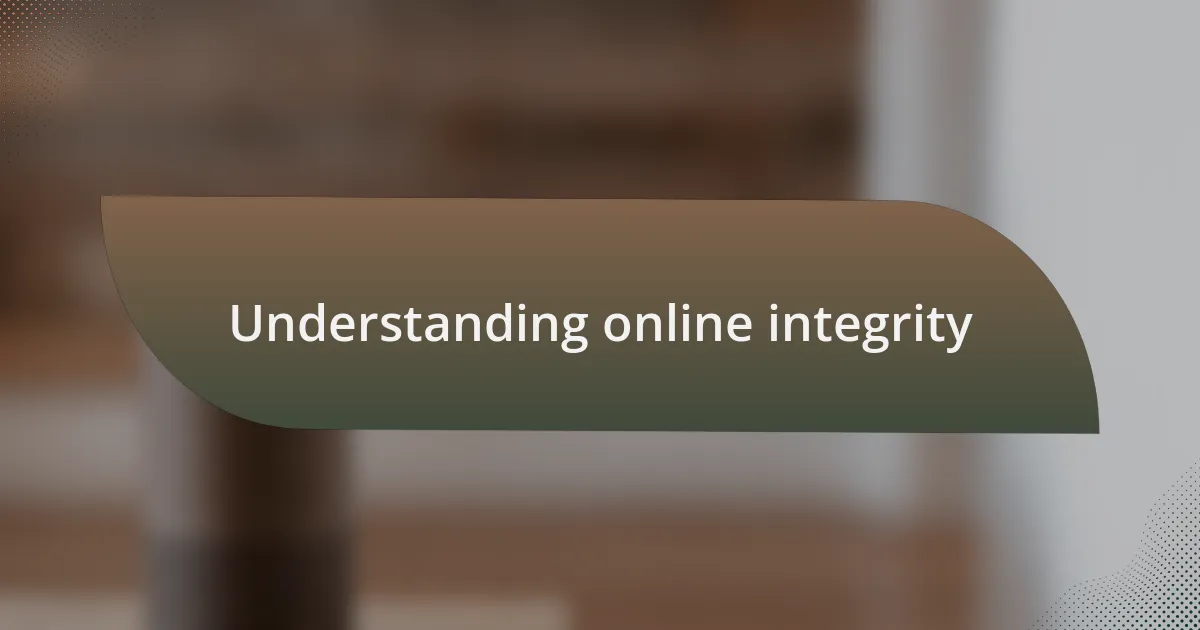
Understanding online integrity
Understanding online integrity means recognizing the importance of authenticity in how we present ourselves. I remember a time when I hesitated to share a personal story online because I worried about judgment. But that moment of vulnerability not only strengthened my connections but also reminded me that truthfulness is the foundation of trust in any digital interaction.
Navigating the digital world can feel overwhelming, especially when it comes to maintaining integrity. Have you ever found yourself at a crossroads, choosing between what’s easy and what’s honest? I certainly have, and choosing to uphold my values often led to more meaningful relationships and interactions. It’s a dance between self-expression and staying true to one’s beliefs, and the rhythm of that balance is what defines our online integrity.
Online integrity is not just about honesty; it’s also about accountability. Reflecting on my own experiences, I’ve faced situations where being transparent about mistakes in public forums wasn’t easy. Yet, addressing those missteps head-on deepened the respect others had for me and upheld the integrity of the spaces I occupied. This journey is not merely individual; it resonates with how we all collectively shape the online environment we engage in.
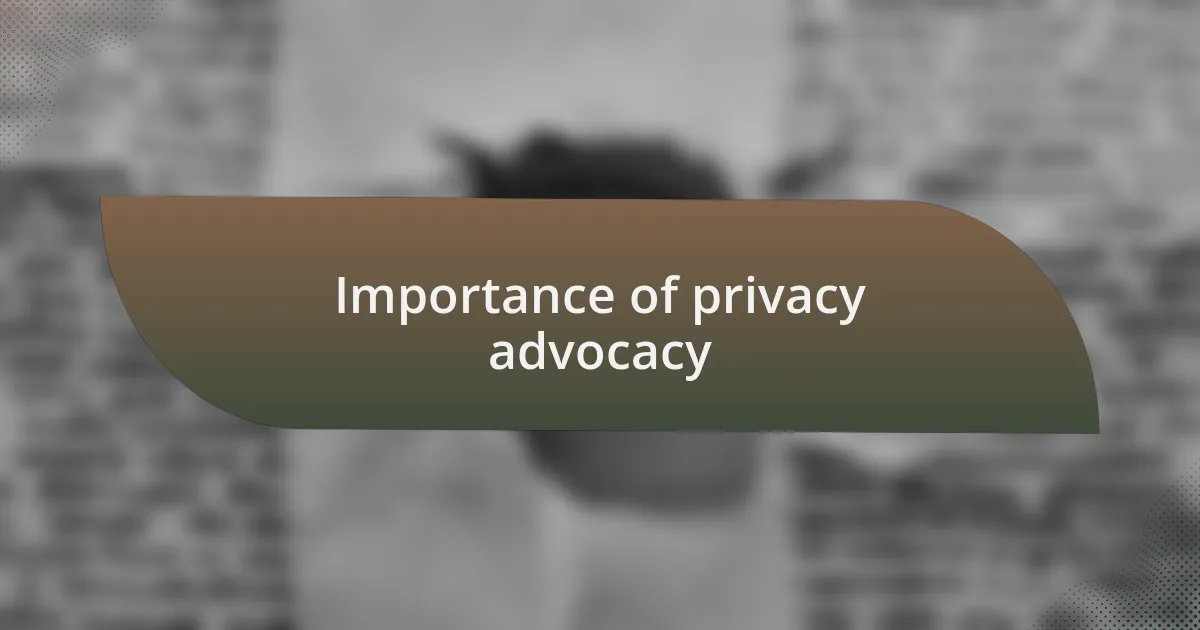
Importance of privacy advocacy
Privacy advocacy plays a crucial role in ensuring that individuals can navigate the digital landscape without sacrificing their personal information. I often think about how vulnerable I felt when I first realized the extent of data collection happening online. It was a turning point for me, igniting my passion for advocating privacy rights and emphasizing that everyone deserves control over their personal data.
When I consider the rapid advancements in technology, I am reminded that without privacy advocacy, many would remain unaware of the potential risks. This awareness creates a ripple effect; when I share insights about data breaches or privacy policies, it empowers others to take action. Have you ever felt a sense of urgency to protect your digital footprint? Those moments of realization foster a community where privacy becomes a shared priority, highlighting the importance of collective action.
Moreover, advocating for privacy isn’t just about protecting ourselves; it’s about fostering a culture that values transparency and consent. I recall a conversation with a friend who felt discouraged by invasive advertising practices. By encouraging her to learn about her rights, I witnessed her transformation from a passive consumer to an empowered advocate for her own privacy. That shift shows just how vital advocacy is in creating informed individuals ready to stand up for their rights in an increasingly complex online world.
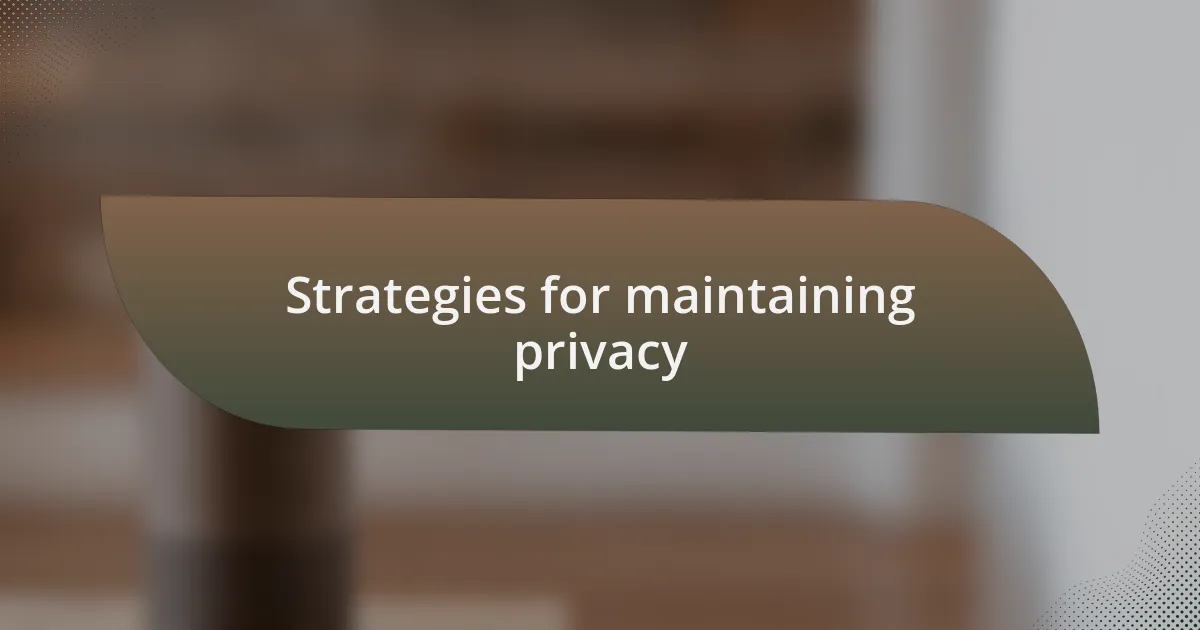
Strategies for maintaining privacy
One effective strategy I use to maintain my privacy online is regularly reviewing my privacy settings across social media platforms. I vividly recall the moment I discovered that a simple app had access to my contacts and location data without my knowledge. Now, I make it a routine to check these settings, limiting who can see my information and making informed choices about what I share. Have you ever felt a twinge of anxiety after realizing how much personal data you unwittingly disclosed? It’s a reminder that taking charge of your privacy is an ongoing process.
Another crucial tactic is using strong, unique passwords and enabling two-factor authentication wherever possible. I learned this the hard way when my account was compromised due to a weak password. Now, I rely on a password manager to generate and store complex passwords, which adds an extra layer of security. The peace of mind that comes from knowing my accounts are safeguarded is invaluable. How often do you consider the strength of your passwords?
I also advocate for using encrypted messaging apps to communicate sensitive information. A few years ago, a close friend and I decided to switch to an encrypted platform after hearing about a data breach involving a popular messaging service. The move was like a protective shield around our conversations, allowing us to chat freely without the fear of eavesdropping. This experience made me appreciate how simple changes can profoundly impact our privacy. Have you thought about how using secure messaging could enhance your online communications?
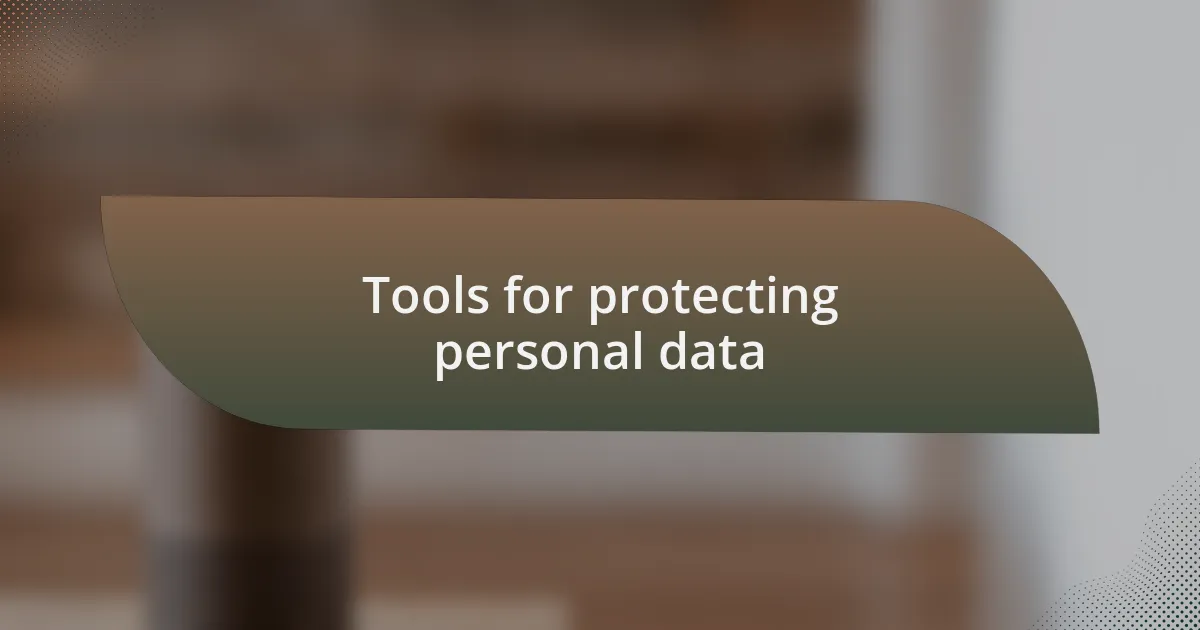
Tools for protecting personal data
When it comes to protecting personal data, I find using Virtual Private Networks (VPNs) to be essential. I remember a trip abroad when I connected to public Wi-Fi at a café, only to later discover how vulnerable my information could have been. Since then, a VPN has been a non-negotiable tool in my online arsenal, disguising my IP address and encrypting my internet traffic. Have you ever considered how easy it is for others to intercept your data when using unsecured networks?
Another pivotal tool is browser extensions that block ads and trackers. One day, I stumbled upon tracking cookies that were following my online behavior, leading to targeted ads so specific it felt invasive. By installing a robust ad blocker, I regained control over my browsing experience. This not only enhanced my privacy but also made my internet usage more enjoyable. Have you ever felt unsettled by how much websites seem to know about you?
Lastly, I heavily rely on data deletion tools to manage the information I leave behind. A few months ago, I was shocked to realize how many old accounts I had that still stored my data. By using a dedicated service to find and delete this information, I felt a weight lift off my shoulders. How often do you think about cleaning up your digital footprint? Taking deliberate steps can significantly reduce your online vulnerability.
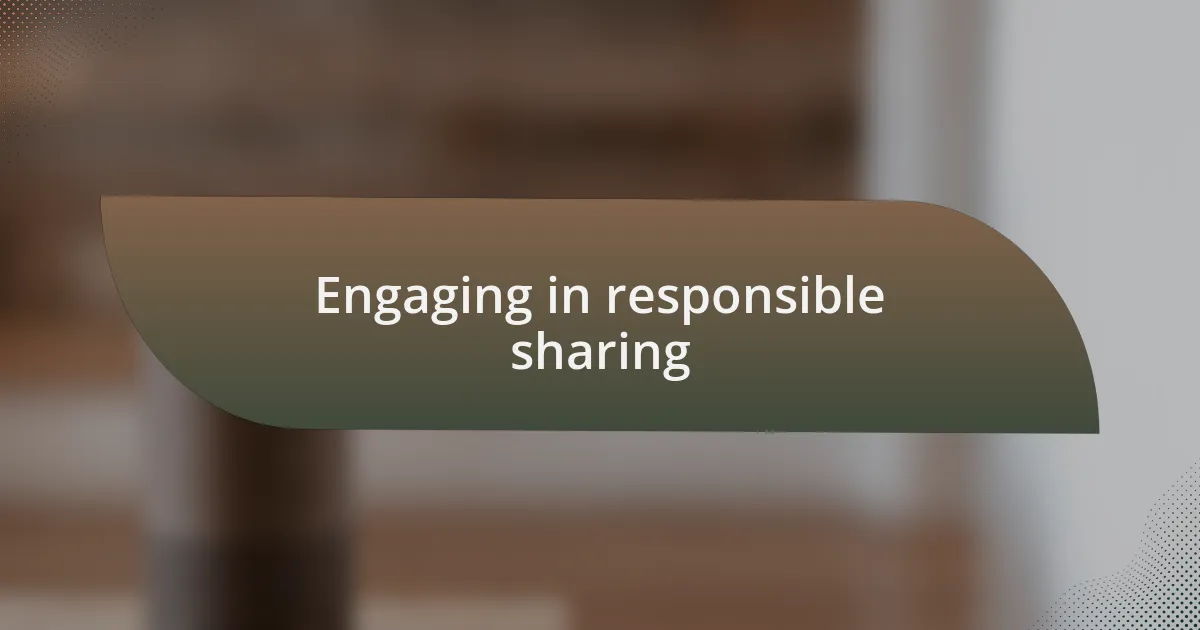
Engaging in responsible sharing
I’ve learned that responsible sharing online goes far beyond just protecting my data. One evening, while scrolling through social media, I saw a post that seemed off. Instead of resharing right away, I took a moment to fact-check. This simple pause revealed misinformation that could have easily spread. How often do we hit that share button without thinking?
It’s crucial to consider the impact of sharing personal stories, too. There was a time I shared a heartfelt experience, only to realize later how it might affect those involved. Reflecting on that made me more mindful about how my stories could impact others’ privacy. It’s a reminder that every post can carry weight—have you ever stopped to ponder the ramifications of what you put out there?
Additionally, I find it essential to manage my audience on sharing platforms. For instance, I adjust my privacy settings regularly to ensure that I’m only sharing with those I trust. Just the other day, I noticed a friend’s setting was public, exposing their personal life to everyone. That prompted me to check and tighten my own settings. How comfortable are you with whom you’re sharing your thoughts and experiences?
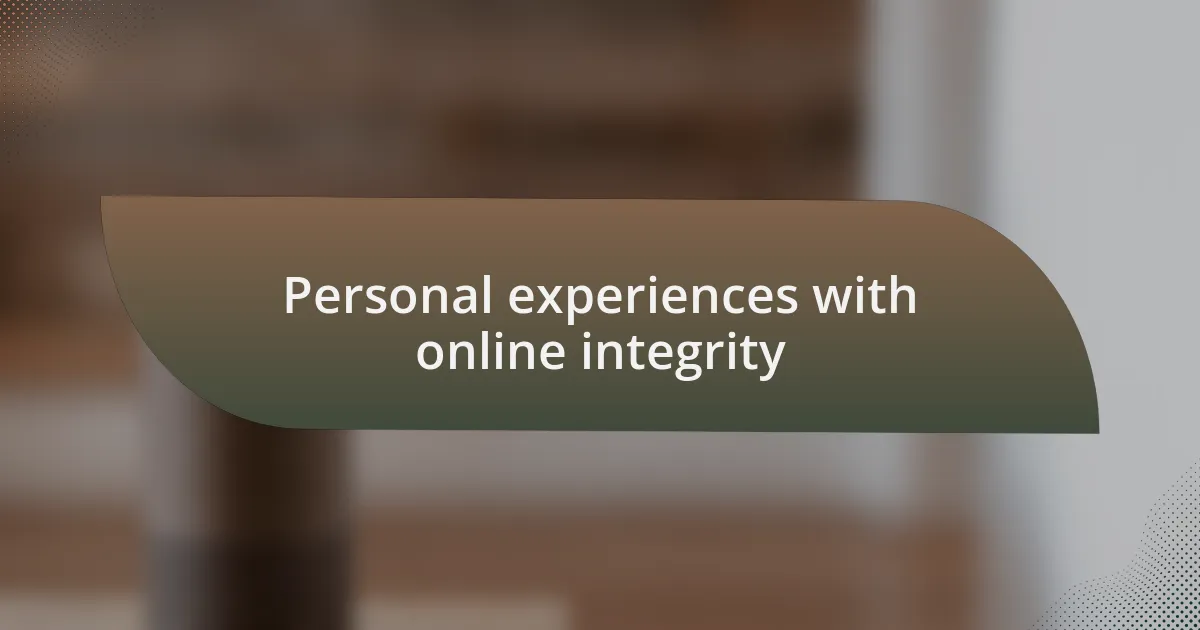
Personal experiences with online integrity
There was a time when I naively posted a picture from a family gathering without considering the ramifications. After sharing, I received a message from a relative expressing concern that someone we barely knew might see it. That moment served as a wake-up call; I realized how easily my trust could be misplaced in the online world. This experience taught me to think twice before sharing even the most innocent moments of my life.
Another impactful moment occurred when I received a comment thread filled with speculation about my personal life. It struck me how quickly opinions were formed based on snippets of information. I felt a mix of anger and vulnerability. This made me more proactive about what I reveal online. How often do we think about how others might interpret our words or images? I learned to be deliberate, ensuring I set the narrative on my terms rather than letting others dictate it.
I remember a specific instance when I was tempted to participate in an online challenge that encouraged sharing personal stories. As I drafted my post, I hesitated; it felt too revealing for the audience I had. I decided to step back and instead shared insights that felt valuable without exposing too much of my private life. Have you faced a similar decision on sharing something meaningful? It’s those thoughtful choices that ultimately help me maintain my online integrity and protect my personal space.
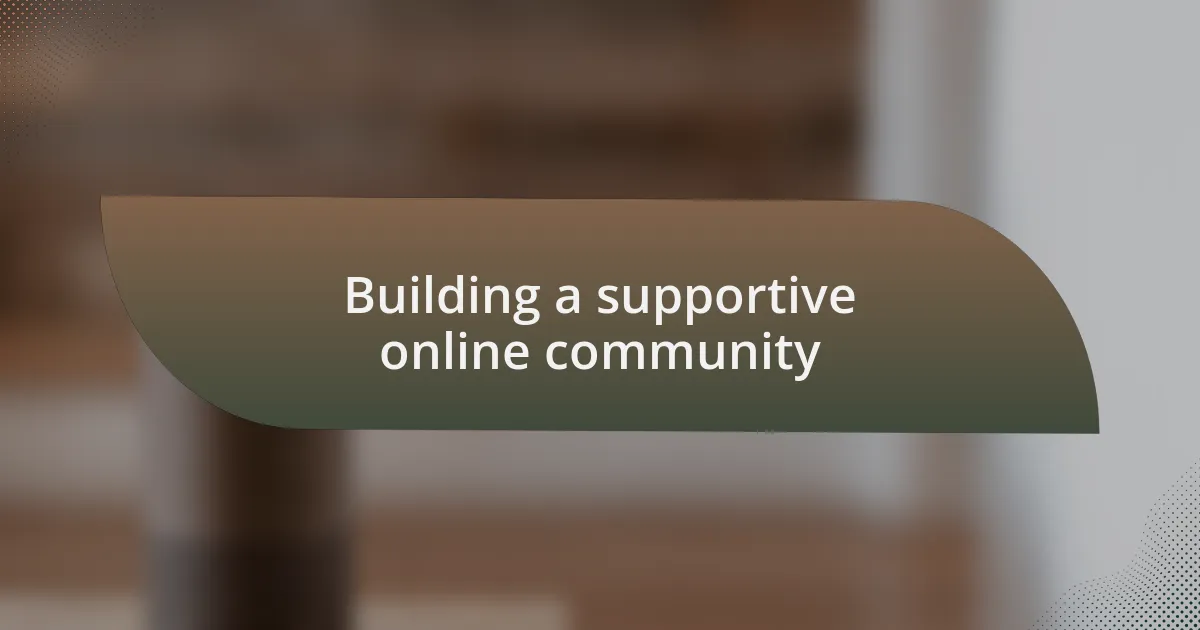
Building a supportive online community
Creating a supportive online community often starts with sharing. I remember joining a forum focused on privacy advocacy, where members openly exchanged stories about their experiences with digital security. It felt refreshing to connect with others who understood the importance of maintaining privacy. This sense of belonging not only validated my concerns but also encouraged me to be more open about my own journey in protecting my information.
Building an online community requires active engagement. There was a time when I shared resources related to online safety tips in a group chat. The responses were overwhelming; members thanked me for providing information that they hadn’t encountered before. It demonstrated to me how a simple act of sharing knowledge could inspire others, creating an environment rich in learning and mutual support. Isn’t it incredible how encouragement can ripple through a community, fostering trust and collaboration?
As I reflect on my online interactions, I recognize the power of empathy. Once, someone shared their struggles with online bullying in a group I was part of. I reached out to offer support, and we ended up having a long conversation about resilience and coping strategies. That connection made me realize that we all have unique challenges, and by being supportive, we can help each other navigate them. How often do we take the time to listen and lift others up in our virtual spaces? It’s these moments of connection that can truly deepen our commitment to fostering a supportive online community.